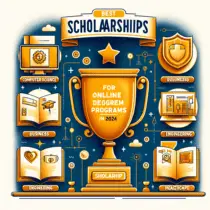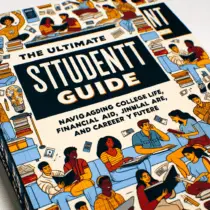The world of education has seen enormous changes over the last decade, with a particularly noticeable shift toward online learning. The convenience, flexibility, and often lower costs associated with online degree programs make them an attractive option for many students. However, tuition fees and other expenses can still be significant. Luckily, there are numerous scholarships specifically designed to support those pursuing online degrees. This article will explore some of the best scholarships available for online degree programs in 2024.
Why Scholarships Are Important for Online Students
Online education offers the flexibility to learn from anywhere at any time, which is ideal for working professionals, parents, or those with demanding schedules. However, despite its benefits, the cost can still be a barrier. Scholarships provide essential financial aid that can help students cover tuition fees and other related expenses such as textbooks and technology.
Types of Scholarships Available
There are several types of scholarships available to online students:
- Merit-Based Scholarships: Awarded based on academic achievements or other talents.
- Need-Based Scholarships: Financial need is the primary criterion for these scholarships.
- Field-Specific Scholarships: Aimed at students pursuing degrees in specific fields like healthcare, IT, education, etc.
- Demographic-Specific Scholarships: Cater to particular groups such as minorities, women, or veterans.
Below are some notable scholarships that can help ease the financial burden of earning an online degree in 2024.
1. Get Educated Online College Scholarship
The Get Educated Online College Scholarship is specifically tailored for students enrolled in accredited online degree programs. It aims to help distance learners afford their education by providing financial aid based on both merit and need.
Eligibility Criteria
- Must be a U.S. citizen.
- Must be enrolled in an accredited online degree program.
- Must have a minimum GPA of 3.0.
Award Amount
Up to $1,000 per award cycle.
Application Process
Applicants must submit an essay explaining why they chose an online degree program and how this scholarship will impact their educational goals.
2. The University of the People Tuition-Free Degree Program
University of the People (UoPeople) offers tuition-free degrees primarily funded through donations and grants from various philanthropic organizations. While not a traditional scholarship program in itself, it significantly reduces financial barriers by eliminating tuition costs altogether.
Eligibility Criteria
- Must meet UoPeople’s general admission criteria.
- Additional criteria may apply depending on specific partnership scholarships available through UoPeople.
Award Amount
Tuition-free; however, there may be nominal fees for exams and application processing.
Application Process
Students must apply directly through UoPeople’s website and meet all admission requirements.
3. Walmart Associate Scholarship
The Walmart Associate Scholarship is available to employees pursuing postsecondary education, including online degrees at accredited institutions.
Eligibility Criteria
- Must be employed part-time or full-time with Walmart for at least six consecutive months before applying.
- Must have demonstrated financial need.
- Must maintain satisfactory academic progress according to school guidelines.
Award Amount
Up to $13 per credit hour at accredited institutions; the maximum award amount varies annually based on funds available.
Application Process
Applicants must complete an application form detailing their academic plans and financial needs through Walmart’s educational assistance portal.
4. Liberty University Online Programs Military Scholarship
Liberty University offers robust support options for military service members pursuing higher education through its military scholarship programs, applicable to both residential and online formats, serving active duty veterans, spouses, dependents, etc.
Eligibility Criteria
- Open exclusively to service members, veterans, reservists, guardsmen, dependents, children, and spouses.
- Enrolled in Liberty University’s undergraduate, graduate, or doctoral programs.
Award Amount
Varies, typically covering a portion of remaining tuition after federal benefits are applied.
Application Process
Requires submission of current military documentation, proof of enrollment, and completion of the FAFSA form.
5. Women Techmakers Scholars Program by Google
Google aims to empower women in the technology field by promoting diversity and inclusion, awarding scholarships to students excelling in computer-related disciplines, including software engineering, data science, cybersecurity, and more.
Eligibility Criteria
- Open to female students globally, irrespective of nationality or ethnicity, who identify as women.
- Must be completing a bachelor’s, master’s, or doctorate at a recognized institution.
- Exhibiting leadership potential and contributing to STEM-related community activities.
- Maintaining a strong academic record within the technological field.
Award Amount
Varies annually based on merit and the number of applicants selected. Previous distributions ranged between $1,000-$10,000 per recipient.
Application Process
Typically opens in late fall and requires submission of a detailed application, including essays, résumé, letters of recommendation, transcripts, and sometimes a video component explaining motivation and vision for the future.
Conclusion
Pursuing higher education is always a valuable investment, regardless of whether the path is traditional on-campus learning or distance learning. The options covered in this article represent just the tip of the iceberg in the continuously evolving landscape of scholarships for online degree programs. New opportunities emerge yearly, making it crucial for students to stay informed, start early, and prepare thoroughly to maximize their chances of securing financial aid. Applying for the right scholarships can unlock doors to possibilities ahead, helping students achieve success in their educational endeavors and paving the way for a brighter future.





